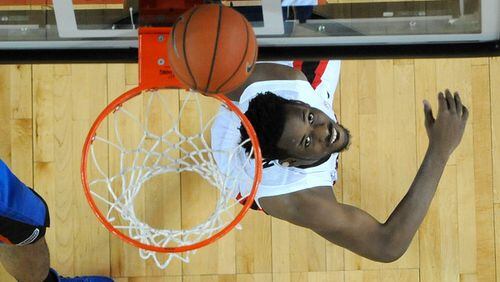Tournament draws can look inviting until the rubber meets the road. Bear that in mind. But also know that Georgia, which needs to win the SEC Tournament to make the NCAA Tournament, might have a better chance than your garden-variety 12th seed in a 14-team field.
Georgia has underachieved massively, a truth underscored again this week when Yante Maten was named SEC Player of the Year by the Associated Press. A member of the team that’s seeded 12th was a unanimous selection to the writers’ all-SEC team; nobody from Auburn, which is seeded first, was.
Which brings us to the overarching theme – pun alert! – of the event in non-centrally located St. Louis: The SEC could/should send eight teams to the Big Dance, but is there one among them that you see making the Final Four, or even the Elite Eight? The same holds for the conference tournament: Who in this field scares anybody? Kentucky and Florida were ranked No. 5 and No. 8 in the preseason AP poll; the former is unranked, the latter 23rd.
Auburn tied Tennessee for the regular-season title, but lost three of its final five games. The Tigers have worked all season without two still-ineligible players and one indicted/fired assistant coach; they’ve now lost center Anfernee McLemore, their one semblance of a big man. They’re well-coached – Bruce Pearl would get a lot of votes for national coach of the year if people could bring themselves to cast a ballot for a rogue – but let’s face it. They’ve overachieved. March won’t be their month.
Tennessee is pretty good but nearly got swept by Georgia. Florida did get swept by Georgia. Kentucky could figure things out at the last minute – the Wildcats did something similar in 2014, reaching the national championship game after a tepid regular season – but a thumping loss in Gainesville on Saturday suggests that this bunch of one-and-dones aren’t yet a real team. There are your top four seeds, the teams that would have to win only three games to snip the nets in St. Louis.
Georgia would have to win five games. The first is against 19-loss Vanderbilt, to which the Bulldogs lost by 15 points in Nashville in their worst display of a pockmarked season. The second would come against Missouri, which could be working with a player – the ballyhooed Michael Porter Jr. – who has played two minutes this season. Yes, he’s really good. But he and his Mizzou mates haven’t exactly had the chance to bond, have they?
Next would come Kentucky. After that, maybe Auburn, unless Texas A&M or Alabama pulls an upset. If you’re looking for non-chalk tournament choices, start with those two, and then include fifth-seeded Arkansas. But don’t forget Georgia.
No SEC team has ever won this tournament by taking five in five days, though Georgia did take the trophy in the tornado-tossed convocation of 2008, in which it won four in four. (The final three in barely 30 hours.) Like those Bulldogs, these are expected to part with their coach within hours of SEC elimination. For Dennis Felton, that elimination never came.
Like this SEC tournament, the 2008 event was one in which neither Kentucky (then in Year 1 of 2 under the overmatched Billy Gillispie) nor Florida (then in Year 1 after consecutive NCAA titles) was anything special. The top seeds were Tennessee, coached by Pearl, and Mississippi State, coached by Rick Stansbury. Neither made the final. Georgia beat State after beating Kentucky. Arkansas beat Tennessee and lost to the Bulldogs in the final.
Understand: This is not a prediction. I’m not picking Georgia to win the tournament. But it would be no shock if the Bulldogs get to Saturday’s semis -- I’m not sure what to expect from Missouri, and I can see this Kentucky team going belly-up. Should they get to Saturday, they’d have a head of steam Georgia hasn’t managed since before Christmas. They’d also be weary, but Felton’s team overcame that, did it not?
The more likely occurrence is that a team that hasn’t risen to many occasions won’t seize its last chance. I can, however, imagine an alternate reality – once in which the weekend arrives and we’re still asking, “Can Mark Fox save his job?”







